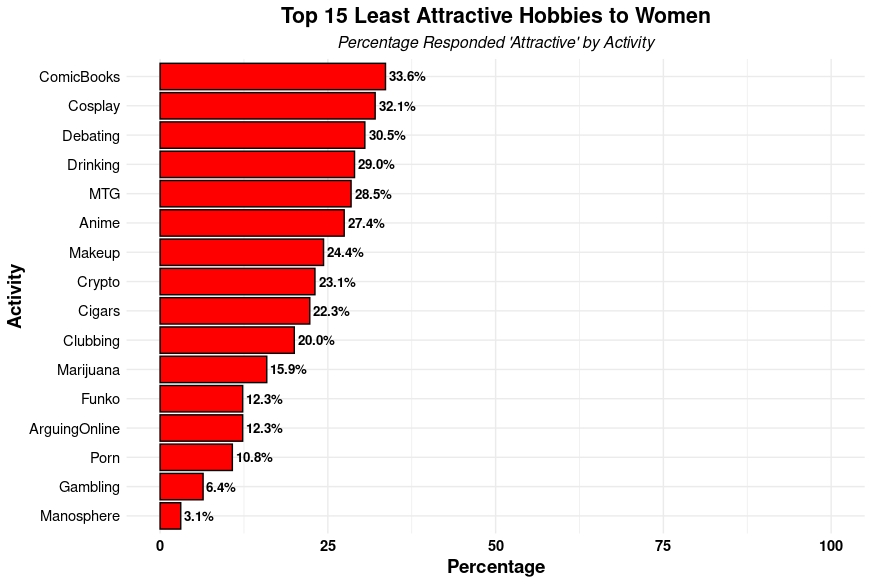What if Male Loneliness is a Good Thing?
The advantage of men not getting a girl from an evolutionary perspective
The title of this story is deliberately provocative in order to get men to think about many of the opinions they hold about women and relationships. I see a lot of men use nature, evolution and biology to argue deeply misogynistic world views. They try to avoid criticism by saying "hey this is just how nature works." It is what leads to article such as What if Women Evolved to be Owned? by Blithering Genius and books with titles like Why Women Deserve Less by self professed misogynists and redpillers like Myron Gaines.
They all decry the “horrors” of women being free to live their lives as they see fit. These manosphere pundits love to use evolutionary arguments to make the case that women ought to be forced back into a submissive role.1 They essentially want women reduced to property, handed off by their fathers to whomever can offer enough for their daughters.
Thus, I thought it was appropriate to actually pursue this style of biological evolutionary argument and show how it actually suggests that male loneliness is a good thing from an evolutionary perspective. I have noticed that many fellow men are perfectly happy to argue that the freedom and privileges of women should be taken away as long as it benefits them. I doubt many of these men will support the conclusions of my analysis, because it is quite detrimental to their interests.
Before going through my argument, let me clarify what I am actually trying to say. The argument is that the male loneliness epidemic is a good thing (from an evolutionary standpoint). But what do we mean by loneliness? Both men and women have significantly fewer friends today than in the 1990s. However, in this case, we are focusing specifically on the fact that 63 percent of American men aged 18 to 19 reported that they were single, while only 34 percent of American women were in the same situation.
This was reported in a Pew study named For Valentine’s Day, 5 facts about single Americans. While it sounds dramatic and like a massive shift this study and analysis suggests the data is likely wrong: There’s No Huge Gender Gap in Being Single Among Young Adults.
But for the sake of argument, we will simply assume there are a lot of single men. I will argue here why that is a good thing from an evolutionary perspective.
Natural Selection and Evolution
When Charles Darwin developed the theory of evolution, he discovered that most animals born do not survive long enough to reproduce. In other words, only a minority of animals pass on their genes. This creates a harsh selection mechanism—only those animals best adapted to their environment survive, while the others die. This culling process is called natural selection. It ensures that the strongest, most capable genes for survival are passed on, while less advantageous genes are filtered out of the population.
Humans evolved bigger brains over countless generations because higher intelligence allowed early human-like animals to survive more effectively. But brains weren’t the only advantage. Humans are uniquely adapted with excellent hand-eye coordination and shoulders capable of throwing objects far and with accuracy. This development allowed humans to hunt prey from a safe distance. Neanderthals, though sturdier and stronger than Homo sapiens, lacked this ability. As a result, researchers have found that Neanderthal skeletons show far more severe injuries from animals compared to Homo sapiens skeletons, suggesting they had to hunt at much closer range.
Okay, let’s not get too deep into evolution—even though I could talk about it for hours. The key takeaway here is simple: evolution only happens when there is a selection process.
Some argue that because modern society protects nearly all individuals from harsh survival pressures, evolution has slowed down or even stopped. But natural selection is not the only force at play in evolution.
There’s also sexual selection. And that’s where things get interesting.
Sexual Selection
Naturally if you die you cannot get offspring. But you cannot get offspring either if you fail to attract a partner. Thus evolution is not based purely on natural selection but also on sexual selection:
Sexual selection can lead males to extreme efforts to demonstrate their fitness to be chosen by females, producing sexual dimorphism in secondary sexual characteristics, such as the ornate plumage of birds-of-paradise and peafowl, or the antlers of deer. Depending on the species, these rules can be reversed.
Sexual selection tends to promote positive traits that aid in survival. This is not surprising. From an evolutionary perspective your ability to survive increases if you pair with someone who is more capable, stronger, more intelligent, skilled and healthy.
Let me cover some traits that are predictors for how likely a man is in a relationship or married.
Income and Relationship Status:
Higher income men are more likely to be in relationships or married: Studies show a strong correlation between male income and marriage rates. A Pew Research study found that among men aged 40-44, those in the top income brackets were significantly more likely to be married than those in the lower brackets.
Lower-income men are more likely to be single: Census data in Western countries consistently show that men with lower incomes are less likely to be married or in long-term relationships.
Career Success and Attractiveness:
Men with stable, high-status jobs tend to have higher relationship and marriage rates.
A study in Evolution and Human Behavior (2017) found that financial security was one of the top traits women valued in long-term partners.
Success in traditional masculine domains (like business, medicine, law, or tech leadership) correlates with higher dating success.
Athleticism and Physical Fitness:
BMI and dating prospects: A 2020 study in Personality and Individual Differences found that men with lower BMIs (within a healthy range) reported more romantic partners and higher self-reported dating success.
Strength and attraction: Research in Proceedings of the Royal Society B (2017) found that upper-body strength was a strong predictor of male attractiveness.
Obesity and relationship status: Studies show that obese men are less likely to be in relationships or get married. Obese men also tend to earn less, reinforcing the wealth-attractiveness correlation.
Online Dating & Mate Selection:
Tinder & OkCupid data: Men in the top 10% of attractiveness, income, or status get the vast majority of matches, whereas men in the bottom 50% receive very little attention.
Height matters: A study analyzing dating profiles found that taller men receive more matches and responses, independent of other factors.
Male Sexlessness & "Relationship Drought":
Younger men (under 30) have seen a rise in reported sexlessness, particularly among lower-income and unemployed groups (General Social Survey, 2021).
In contrast, high-status men in their 30s-50s have historically had more stable relationships and marriages.
While we covered physical attributes and economic success, it is also telling what kind of male hobbies women find attractive. These are the top most attractive hobbies according to women for a man to have:

While these are the least attractive hobbies:

Basically what you can see is that women value traits that signal intelligence, capability, practical ability and strength. That is not surprising from an evolutionary standpoint. A strong man has the potential to protect a woman but if he lacks skills and capability he will not be able to build shelter or hunt.
Hence things like being employed, making more money, being physically fit etc is seen as attractive. Conversely, men who are unemployed, obese, or low-income are disproportionately single. In other words the prevalent redpill idea that women somehow pick "wrong" is not supported by the data.
Evolutionary Advantage of Male Loneliness
If the human species is to continue evolving rather than stagnating, there must be a selection process—where individuals with better genes are chosen to reproduce, while those without advantageous traits are excluded from passing on their genes.
In other words, a surplus of single men is a good thing from an evolutionary standpoint. The men who lack desirable traits—whether intelligence, income, or physical health (linked to strength and vitality)—are naturally filtered out. Meanwhile, attractive, intelligent, and high-earning men are selected, ensuring superior genes are passed on.
Of course, not all women can marry the same small pool of high-status men at once. So from an evolutionary perspective, divorce is a good thing. Single mothers are a good thing. If a highly successful man impregnates a woman and then divorces her, he is free to marry again and reproduce with another partner. This increases the spread of his superior genes.
Elon Musk is a prime example of this behavior. As the world’s richest man, he continuously partners with attractive, intelligent women, has children with them, and then moves on to the next. Following this formula, he now has 13 children.
From an evolutionary standpoint, the genes of such a successful male should be spread widely. Therefore, one could argue that divorce should be encouraged, and single mothers should receive strong financial support. This would incentivize women to leave their partners, allowing their highly successful ex-husbands to move on and impregnate new partners, further distributing "superior genes."
Your Argument is Immoral and Repugnant
Does my conclusions and arguments offend you? If so, I have made my point. My point is that these sort of evolutionary style arguments will frequently lead to deeply troublesome conclusions. Don't be so overly comfortable with those conclusions as a man if they are detrimental to women.
These manosphere redpill misogynist men have advocated for the de-facto enslavement of women to deal with the male loneliness epidemic. An epidemic which may not even exist as this study suggests: There’s No Huge Gender Gap in Being Single Among Young Adults.
You cannot seek to satisfy the happiness of one gender by destroying the happiness of another. The irony of men advocating for the old arrangement—where women were treated as property—is that such a system actually undermined evolution. It ensured that all men had offspring. But from an evolutionary standpoint, that’s a negative. Evolution favors selection, meaning only a minority—the most successful, intelligent, and attractive men—should reproduce.
What these men are doing is pushing repugnant fascist policies while desperately trying to shield themselves by saying, “Oh, it’s just nature.” It reminds me of how many right-wingers excuse other bad social outcomes by shrugging and saying, “That’s just what the market wants.”
I see this logic frequently in the American right. I stress the American right because, in my view, conservatives in Western Europe tend to be far more sensible and reasonable. We shouldn’t confuse what’s happening in the U.S. with the rest of the Western world. The U.S. is an outlier in many ways. The Trump movement is a good example—while European conservatives support Ukraine and condemn Putin, Trump undermines NATO and cozies up to autocrats.
It’s very easy to run away from moral responsibility when you claim your position is ideologically neutral. These people argue that evolution or the free market isn’t political—so their own views must be purely objective and neutral.
But their views are not neutral. Appealing to the “natural order” is a classic fascist rhetorical trick. Historically, fascists have used this argument to justify war, saying violence is natural. They’ve claimed the strong should rule over the weak. That “might makes right.” That murdering disabled people is justified because they wouldn’t have survived in nature anyway. It’s the same logic used to argue that women shouldn’t work, shouldn’t vote, and should stay home to cook and give birth.
In Norway, we have our own version of this convenient escape from responsibility. Politicians will say, “Oh, it’s an EU directive,” when passing laws unpopular with voters. But since Norway is not a full EU member—only part of the European Economic Area (EEA)—we actually have the power to say no to these directives. That’s the whole reason we stayed outside the EU in the first place. Yet, politicians use this excuse to avoid admitting that they themselves actually support the unpopular policy.
Whether it’s nature, markets, religion, or the EU, it’s always convenient to blame someone else rather than own up to supporting a bad or unpopular viewpoint.
The oldest trick in the book for oppressing women is religion. Religion is malleable that way. It has been used to justify slavery, misogyny, and violence. Men shield themselves from criticism by insisting, “It’s not my personal opinion—it’s just God’s will.” They conveniently ignore the fact that they only follow the parts of scripture that suit them and discard everything else.
Take Jesus, for example. He was explicitly against hoarding wealth. He preached compassion, sharing, and forgiveness. He spoke of loving those who are different—whether foreigners, sinners, or people society deemed immoral. And yet, isn’t it ironic that the most religious Western country, the U.S., is also the one that worships material wealth the most?
This same country has the longest prison sentences, the most brutal overcrowded prisons, and the largest prison population in the world. There’s not much forgiveness happening there.
It’s proof that nobody truly cares about scripture—except when it can be weaponized to justify the regressive views they already hold.
My Views on Loneliness
I don’t personally think the male loneliness epidemic is a good thing. I believe it has been exaggerated, as later research has shown, but we need to stop blaming feminism or women’s sexual freedom. This isn’t about that. Since the 1990s, both men and women have had fewer friends. What we are witnessing is a broader increase in social isolation.
I see the same pattern with my own children, and I hear similar concerns from other parents. Kids today spend less time outside and with friends than my generation did. And this has absolutely nothing to do with women’s liberation—it’s about technological change.
The physical world has become less relevant. Before, I would go to magazine stores to find something to read. Now, I get it instantly on my phone or computer. The same applies to movies. I used to visit video rental shops, movie theaters, or travel abroad to experience something different. Now, everything is available on Amazon, Netflix, or a streaming service delivered straight to my door.
Even though I was a computer geek from a young age, I still had to leave my house. There was no internet to download games from. I had to visit friends to swap floppy disks, and some of those friends lived far away. I biked uphill for half an hour just to get new games. You could stay fit almost by accident—just through the effort of maintaining your hobbies. Many friendships were built that way. Today, kids make a lot of friends online, but that isn’t the same. The connections aren’t as strong as those formed through physical presence.
That being said, not all of this isolation is bad. Kids in the 1980s got up to a lot more trouble. The kids today who stare at a computer screen for hours might otherwise have been out smashing school windows, destroying streetlights with slingshots, shooting birds with airguns, getting into fights, vandalizing subway cars, or cutting up bus seats with knives. These were all common problems back then. Crime rates today are much lower than in the 1990s.
It’s easy to romanticize the past. While we have new problems today, we forget that some old problems have disappeared or become much smaller.
And the idea that feminism has left men lonely collapses under historical evidence. This issue has existed throughout human history. Ancient Greece, Rome, China, and medieval Europe all had large populations of unmarried men. Often, it was because men couldn’t afford marriage or because a bride’s family couldn’t afford the required payment. In many societies, wealthy men hoarded wives and mistresses, reducing the number of available women for everyone else.
The idea that most men historically married young comes from a single, unusual historical anomaly: 1950s America. But this was not a time of arranged marriages. Women still chose their husbands. The reason most men could afford marriage was because 1950s America was an era of unprecedented affluence. It was a country of vast natural resources, a wartime economic boom, and an economy that made homeownership and family life widely accessible.
That wasn’t the case elsewhere. In 17th-18th century England, 20% of men never married. In pre-revolutionary France, peasants often delayed marriage until their 30s. In Scandinavia, farmland shortages forced many men to remain single well into adulthood.
When the big wave of Norwegian migrants left for America in the 1870s, they received for free about 20 times more high-quality farmland than the average Norwegian farmer had back home. Let that sink in. America was a land of overabundance, which created social conditions that were completely abnormal compared to the rest of the world.
Yet, many American conservatives try to extrapolate from this unique period to draw conclusions about human nature and how men and women should relate to each other. The 1950s and 1960s America that they fetishize was never reality anywhere else.
Conservatives never see a problem with modern society that they don’t think can be solved by rolling back the clock to some glorified past that never existed. Instead, we must look forward.
Technology Needs to Be Regulated—Not women
We need to regulate technology so that it doesn’t take over our lives.
We also need to rethink how we use it. I’ve previously advocated for AI-powered phones without screens. Sounds odd? The idea is that such a device could handle most daily digital tasks—authentication, messaging, calls, transit payments, music, podcasts—without requiring people to stare at a screen. Why? Because screens are the main source of distraction. People literally walk down crowded streets glued to their phones.
We also need a revival of books. In Norway, schools now predominantly use iPads. But in Denmark and other countries, there is growing talk of bringing books back.
The problem with technology isn’t just how much we use it—it’s how it’s designed to addict us. Social media and video games are deliberately engineered to be as addictive as possible. But there is nothing inevitable about this. It is perfectly possible to design games and social media services that are less addictive.
Of course, that’s not in the interest of tech companies, who profit from keeping us hooked. That’s why we need political initiatives and regulation to take back control of our lives.
And yet, it’s funny—the same people who scream about the evils of government regulation will turn around and argue that women’s voting rights should be revoked, that arranged marriages should return, or that society should be forcibly restructured to suit their needs.
Somehow, they think it’s fine to strip women of their rights, but regulating markets is beyond the pale.
A loosely connected online subculture focused on men’s issues, dating, and masculinity, often promoting misogynistic, anti-feminist, and reactionary views. It includes communities such as Men’s Rights Activists (MRAs), Pick-Up Artists (PUAs), Men Going Their Own Way (MGTOW), and the Red Pill movement.







How would you respond if someone found this argument persuasive from a left-wing point of view, such that it either convinced them to become a eugenicist feminist against undesirable men, or a pro-patriarchy communist in the name of opposing the eugenical effect of female attraction?
In the animal kingdom females have always chosen their mates and they should always maintain that power. After all, their biology is key to procreatio and they do 98% of the work to bring those newborns to adulthood.
To the men who don't understand nature, clean up your act such that you are attractive to the women. Show them the respect they deserve and that you are worthy of their attention. Women are never going to be property ever again. Any other point of view is self pitying garbage.